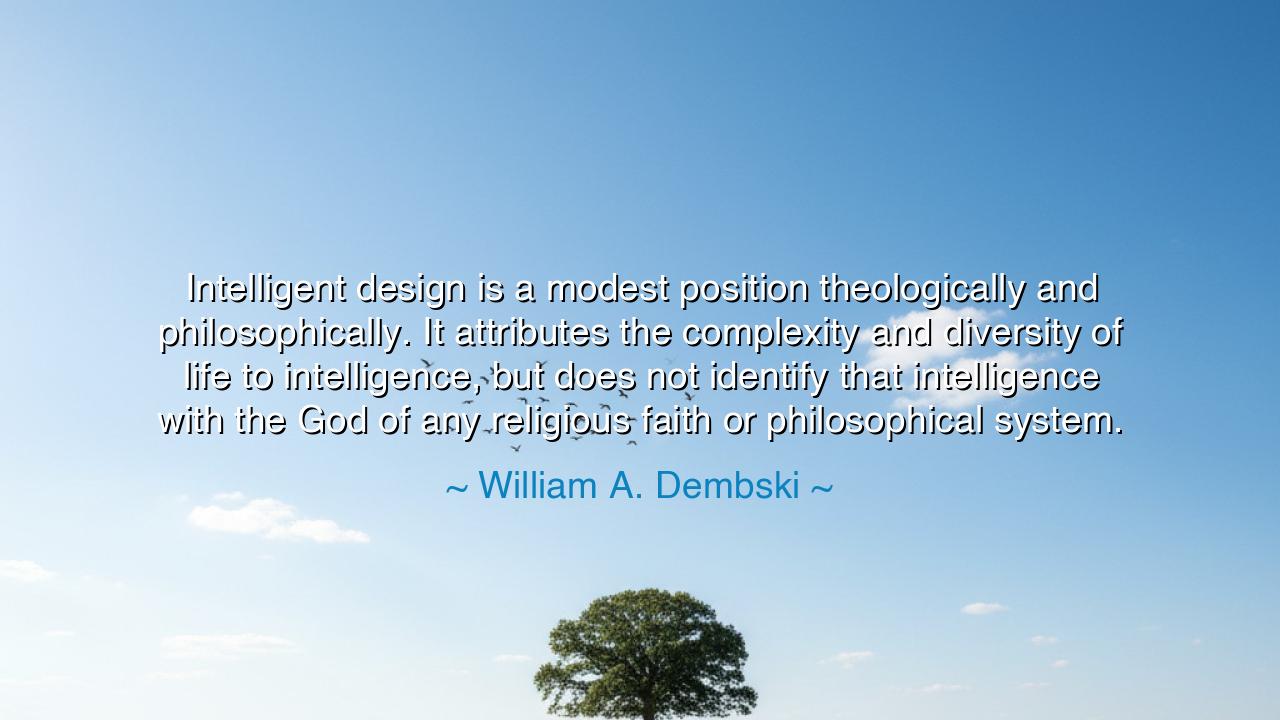
Intelligent design is a modest position theologically and
Intelligent design is a modest position theologically and philosophically. It attributes the complexity and diversity of life to intelligence, but does not identify that intelligence with the God of any religious faith or philosophical system.






The words of William A. Dembski, a mathematician and philosopher of science, stand at the crossroads of faith and reason, shimmering with both humility and daring: “Intelligent design is a modest position theologically and philosophically. It attributes the complexity and diversity of life to intelligence, but does not identify that intelligence with the God of any religious faith or philosophical system.” In these lines, Dembski speaks not as a prophet, nor as a preacher, but as a seeker — one who gazes upon the mystery of creation and refuses to dismiss its order as mere accident. Yet, unlike zealots who would claim certainty, he stands in reverence before the unknown, calling his position “modest.” For what he presents is not the roar of dogma, but the quiet admission that intelligence, not chaos, may be woven into the fabric of life.
The origin of this quote arises from the debate between science and belief, between those who see the universe as a grand design and those who see it as a dance of chance. In the halls of academia, Dembski became one of the foremost voices of the intelligent design movement, which contends that the natural world bears marks of purposeful arrangement — the fingerprint of intelligence. Yet, as he himself clarifies, this is not theology in disguise; it is a philosophical position, born of reason as much as wonder. The intelligence he speaks of is not bound to creed or scripture. It is not the thunderous God of myth, but the quiet architect inferred from the structure of existence itself. His modesty lies in what he refuses to claim — he names no deity, offers no revelation, and yet dares to say that behind the veil of nature, there is mind.
In this, Dembski echoes the wisdom of the ancients, who looked upon the stars and discerned harmony rather than chaos. The Greeks called it Logos, the divine reason that ordered all things. The Egyptians spoke of Ma’at, the principle of truth and balance that sustained the cosmos. Even the philosophers of the East — from Laozi to the sages of India — taught that an unseen intelligence breathes through every form. Dembski’s insight is the heir to this lineage: he resurrects an old truth in modern garb, reminding a skeptical age that intellect and mystery are not enemies but twins, born from the same light.
Consider Isaac Newton, who gazed upon the falling apple and the motion of the planets. He wrote of gravity in the language of numbers, yet his heart whispered that such precision could not be without purpose. He saw in every law a sign of mind, though he, too, spoke carefully — knowing that to name the divine in science was to risk both ridicule and misunderstanding. Newton, like Dembski, stood between worlds: the measurable and the immeasurable, the seen and the unseen. His humility before the universe did not diminish his intellect; it magnified it.
There is a profound lesson in this — that to seek meaning in complexity is not folly, but wisdom. The diversity of life, from the spiral of a shell to the architecture of DNA, may be more than a random flourish of matter. Yet, as Dembski reminds us, one must tread softly. To see intelligence in creation is not to claim knowledge of its source, nor to wield it as a weapon of belief. It is to acknowledge the mystery of intelligence itself, to honor the possibility that the mind behind existence is greater than any creed can contain. True understanding, he implies, requires both awe and restraint — the courage to affirm design, and the humility to admit we do not yet know the designer.
In a world where faith and science often clash like storm and sea, Dembski’s words call for balance — for a renewal of dialogue between heart and intellect. His “modest position” reminds us that reverence need not silence reason, and that reason need not extinguish reverence. The one who seeks truth must stand between these realms, listening to both the data of the laboratory and the whisper of wonder within the soul.
Thus, my children, learn from this: when you behold the beauty of the world — the flight of a bird, the precision of the stars, the pulse of your own breath — do not rush to name its author, nor to deny its meaning. Stand instead in awe, as Dembski teaches, knowing that to wonder is the beginning of wisdom. Seek to understand, but do not demand to control. The universe may indeed be designed — and perhaps, in the quiet intelligence that flows through all things, you too are part of that design. Live, then, as though your own life were a thread in that vast tapestry — purposeful, intelligent, and radiant with the mystery that sustains it.






AAdministratorAdministrator
Welcome, honored guests. Please leave a comment, we will respond soon